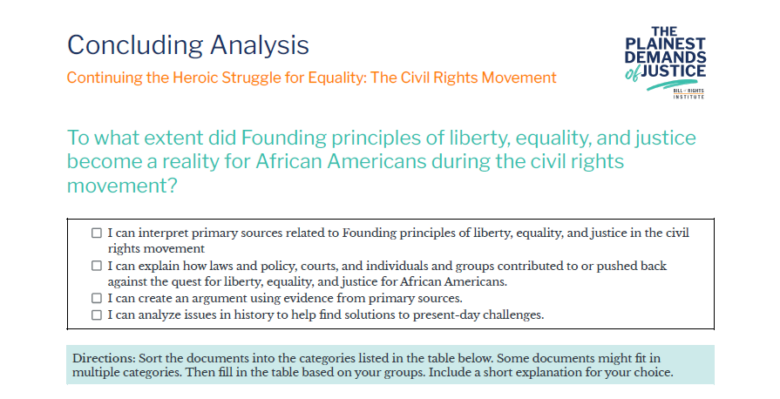Concluding Analysis: Lesson 5, Plainest Demands of Justice
To what extent did Founding principles of liberty, equality, and justice become a reality for African Americans during the civil rights movement?
- I can interpret primary sources related to Founding principles of liberty, equality, and justice in the civil rights movement
- I can explain how laws and policy, courts, and individuals and groups contributed to or pushed back against the quest for liberty, equality, and justice for African Americans.
- I can create an argument using evidence from primary sources.
- I can analyze issues in history to help find solutions to present-day challenges.
Directions: Sort the documents into the categories listed in the table below. Some documents might fit in multiple categories. Then fill in the table based on your groups. Include a short explanation for your choice.
| Document Title and Date | Laws and Policy | The Courts | “We the People” – individuals and groups |
|---|---|---|---|
| Richard Wright, Black Boy, 1945 | Writer shows that racial hostility and violence are normalized in the Jim Crow South | ||
| Sweatt v. Painter, 1950 | |||
| Ralph Ellison, Invisible Man, 1952 | |||
| Brown v. Board of Education, 1954 | |||
| Martin Luther King, Jr., Montgomery Bus Boycott Speech, 1955 | |||
| The Southern Manifesto, 1956 | |||
| Student Nonviolent Coordinating Committee Founding Statement, 1960 | |||
| James Baldwin “Fifth Avenue, Uptown,” 1960 | |||
| Freedom Rides Photographs, 1961 | |||
| Martin Luther King, Jr., “Letter from Birmingham Jail,” 1963 | |||
| Martin Luther King, Jr., “I Have a Dream”, 1963 | |||
| John Lewis, Speech at the March on Washington, August 28, 1963 | |||
| “We Shall Overcome” | |||
| Malcolm X, “Message to the Grassroots”, 1963 | |||
| Civil Rights Act, 1964 | |||
| Fannie Lou Hamer Testimony before the Credentials Committee, Democratic National Convention, August 22, 1964 | |||
| Images of Bloody Sunday, 1965 | |||
| Voting Rights Act, 1965 | |||
| Loving v. Virginia, 1967 |
- How did civil rights activists demonstrate courage during this period of the civil rights movement? Discuss one specific example from the documents.
- What influence did religious belief have on African American protest in the civil rights movement?
- What continuities and changes do you find between the Reconstruction era and the civil rights movement?
- To what extent were Founding principles of liberty, equality, and justice realized for African Americans during the civil rights movement?
